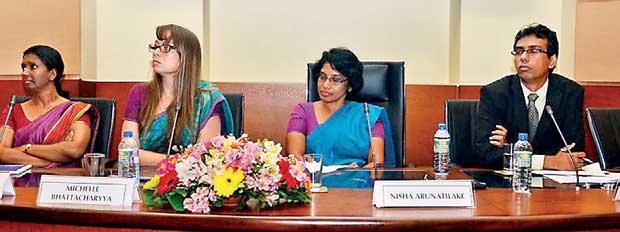Reply To:
Name - Reply Comment
Last Updated : 2024-04-20 20:10:00
 From left: IPS Research Economist Priyanka Jayawardena, GLWC Coordinator Michelle Bhattacharya, IPS Research Fellows Nisha Arunatilake and Manoj Thibbotuwawa
From left: IPS Research Economist Priyanka Jayawardena, GLWC Coordinator Michelle Bhattacharya, IPS Research Fellows Nisha Arunatilake and Manoj Thibbotuwawa
According to a study by Institute of Policy Studies (IPS), the estimated living wage (a little more than the minimum pay rates needed to let workers and their families lead a decent life) for the estate workers in the tea plantation industry in Sri Lanka was Rs. 21,585 in December 2015.
However, the prevalent wage at the time was only Rs. 16,971. With the wage revisions in October 2016, this gap narrowed significantly with the living wage estimate standing at Rs.21, 866 and the prevalent wage being Rs. 19,021. Due to high inflation level in July 2017, the estimate of the living wage increased to Rs.23, 314 while the prevalent wage remained at 19,086, widening the gap once again. This study marked the start of a journey towards paying the workers in the estate sector a living wage by estimating a living wage for the tea sector in the country, which accounted for 12.3 percent of total exports in 2016 in Sri Lanka. Unlike the minimum wage, a living wage is not legally enforced. Official poverty line wage for Sri Lanka stands at Rs.8, 236. The purchasing power parity (PPP) adjusted World Bank extreme poverty line wage for Sri Lanka stands at Rs. 6,170.
“…it is clear that both the Sri Lankan official poverty line wage and World Bank poverty lines wages are too low to provide sufficient income to afford a basic living wage,” the study stated.
The findings from the IPS study were revealed at the Stakeholder Validation workshop held last week, conducted by the Research Fellows Manoj Thibbotuwawa and Nisha Arunatilake and Research Economist Priyanka Jayawardena.
The workshop was organized by the IPS, Global Living Wage Coalition (GLWC), and Fairtrade International (FLO) with the participation of a wide range of stakeholders, including representatives from the Regional Plantation Companies (RPCs), estate sector trade unions and policymakers.
Presenting the findings of the study, Dr. Thibbotuwawa noted that the real wage in the tea estate sector was the lowest when compared to rubber, coconut, and paddy sectors.
On a positive note though, he said that real wage has increased at a higher rate than the inflation, favouring the employees and the daily wages of RPC workers are much better than other key industries in the informal sector.
He also pointed out that the wage was not the only factor that has determined the low living standards in the estate sector. Poor financial management of the employees also contributed to the poor living conditions that confront the estate sector workers.
Meanwhile, Michelle Bhattacharya, Coordinator of the GLWC (partner in the study), pointed out that making sure a workers’ wage is enough to sustain himself and his family is of paramount importance to social economic progress.
The presentations were followed by an engaging Q&A session where the stakeholders raised issues that were of concern to them.
Expressing his views, Head of the Planters’ Association which represents the RPCs, Roshan Rajadurai, pointed out that Sri Lanka pays the highest wages to estate workers, compared to other major tea producers, such as Kenya and India.
The IPS research study estimated a living wage for the estate workers in the tea plantation industry in Sri Lanka in December 2015, using the Anker methodology.
The methodology estimated the per capita cost of a basic, but decent, quality life style, which includes food, housing, clothing and footwear, health and education, other essential costs and unforeseen contingencies.
This benchmark was compared with the prevailing wages in the tea industry while highlighting the importance of considering the economic aspects such as productivity, sustainability and competitiveness of the industry as well. .
It is hoped that the findings of this study will be useful in identifying the bottlenecks in improving living standards for workers by collaborating with all stakeholders concerned both within Sri Lanka and abroad.

Add comment
Comments will be edited (grammar, spelling and slang) and authorized at the discretion of Daily Mirror online. The website also has the right not to publish selected comments.
Reply To:
Name - Reply Comment
On March 26, a couple arriving from Thailand was arrested with 88 live animal
According to villagers from Naula-Moragolla out of 105 families 80 can afford
Is the situation in Sri Lanka so grim that locals harbour hope that they coul
A recent post on social media revealed that three purple-faced langurs near t